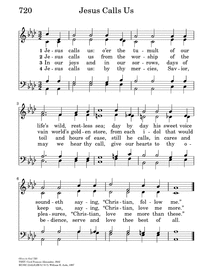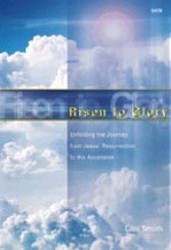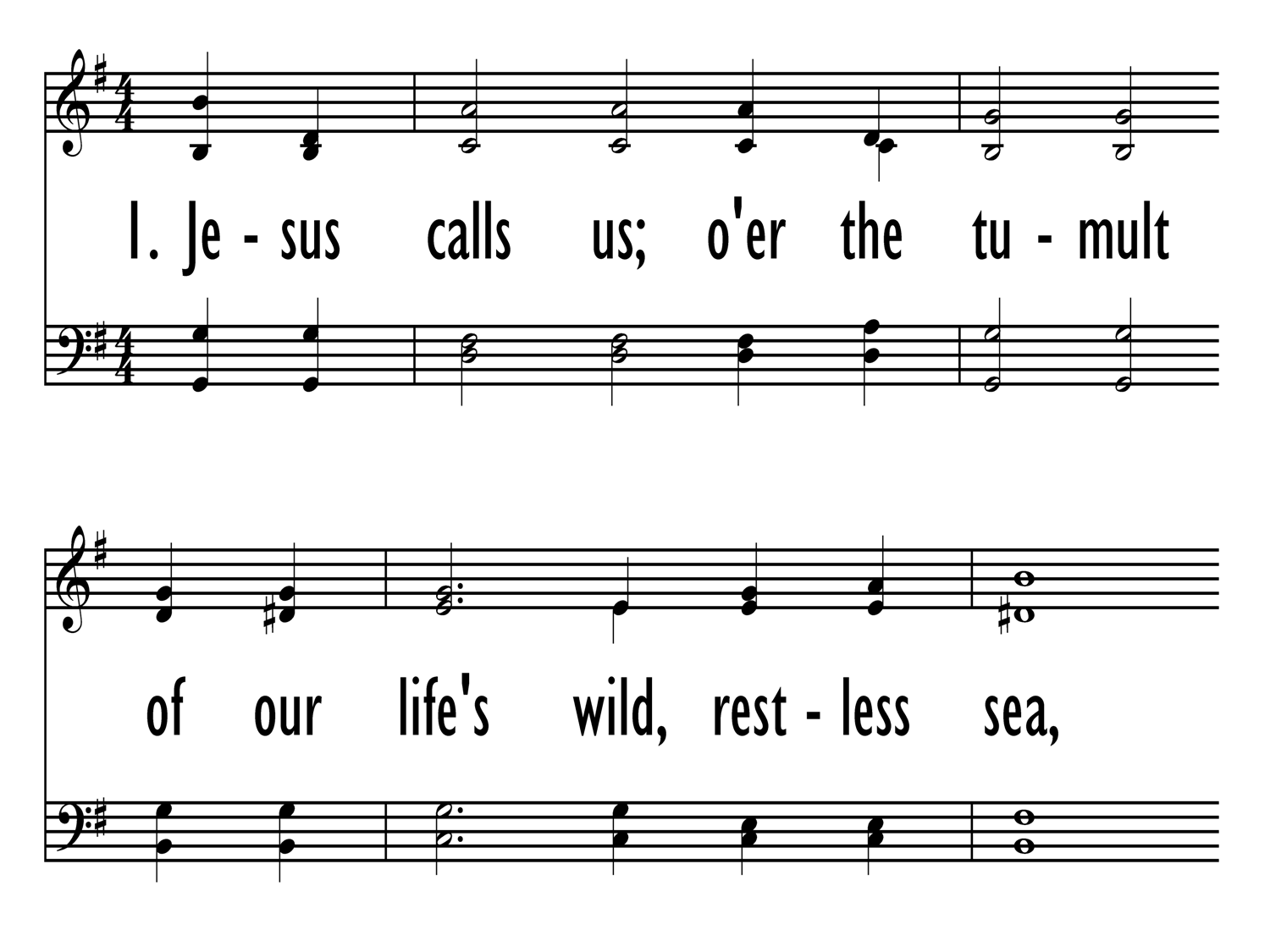- |
User Links
Jesus Calls Us, O'er the Tumult

Jesus calls us, o'er the tumult
Author: Cecil Frances Alexander (1852)Tune: GALILEE (Jude)
Published in 944 hymnals
Printable scores: PDF, MusicXMLAudio files: MIDI, Recording
Representative Text
1. Jesus calls us o'er the tumult
Of our life's wild, restless sea;
Day by day his sweet voice sounding,
Saying, "Christian, follow me."
2. Brothers Simon, Andrew heard it
By the Galilean lake,
Turned from home, and toil, and kindred,
Leaving all for His dear sake.
3. Jesus calls us from the worship
Of the vain world’s golden store,
From each idol that would keep us,
Saying, “Christian, love me more.”
4. In our joys and in our sorrows,
Days of toil and hours of ease,
Still he calls, in cares and pleasures,
“Christian, love me more than these.”
5. Jesus calls us—By your mercies,
Savior, may we hear your call,
Give our hearts to your obedience,
Serve and love you best of all.
Source: Hymns and Devotions for Daily Worship #61
Author: Cecil Frances Alexander
 As a small girl, Cecil Frances Humphries (b. Redcross, County Wicklow, Ireland, 1818; Londonderry, Ireland, 1895) wrote poetry in her school's journal. In 1850 she married Rev. William Alexander, who later became the Anglican primate (chief bishop) of Ireland. She showed her concern for disadvantaged people by traveling many miles each day to visit the sick and the poor, providing food, warm clothes, and medical supplies. She and her sister also founded a school for the deaf. Alexander was strongly influenced by the Oxford Movement and by John Keble's Christian Year. Her first book of poetry, Verses for Seasons, was a "Christian Year" for children. She wrote hymns based on the Apostles' Creed, baptism, the Lord's Supper, the Ten Commandment… Go to person page >
As a small girl, Cecil Frances Humphries (b. Redcross, County Wicklow, Ireland, 1818; Londonderry, Ireland, 1895) wrote poetry in her school's journal. In 1850 she married Rev. William Alexander, who later became the Anglican primate (chief bishop) of Ireland. She showed her concern for disadvantaged people by traveling many miles each day to visit the sick and the poor, providing food, warm clothes, and medical supplies. She and her sister also founded a school for the deaf. Alexander was strongly influenced by the Oxford Movement and by John Keble's Christian Year. Her first book of poetry, Verses for Seasons, was a "Christian Year" for children. She wrote hymns based on the Apostles' Creed, baptism, the Lord's Supper, the Ten Commandment… Go to person page >Text Information
Related Texts
| First Line: | Jesus calls us, o'er the tumult |
| Title: | Jesus Calls Us, O'er the Tumult |
| Author: | Cecil Frances Alexander (1852) |
| Meter: | 8.7.8.7 |
| Language: | English |
| Notes: | Spanish translation: See "Desde el cielo Cristo llama" |
| Copyright: | Public Domain |
- (hymns)
- (hymns)
- (hymns)
- (hymns)
- (hymns)
- (hymns)
- (hymns)
- (hymns)
- (hymns)
- (hymns)
- (hymns)
- (hymns)
- (hymns)
- (hymns)
- (hymns)
- (hymns)
- (hymns)
- (hymns)
- (hymns)
- (hymns)
- (hymns)
- (hymns)
- (hymns)
- (hymns)
- (hymns)
- (hymns)
- (hymns)
- (hymns)
- (hymns)
- (hymns)
- (hymns)
- (hymns)
- (hymns)
- (hymns)
- (hymns)
- (hymns)
- (hymns)
- (hymns)
- (hymns)
- (hymns)
- (hymns)
- (hymns)
- (hymns)
- (hymns)
- (hymns)
- (hymns)
- (hymns)
- (hymns)
- (hymns)
- (hymns)
- (hymns)
- (hymns)
- Year A, Christmas season, New Year's Day
- Year A, Epiphany season, Third Sunday
This is recommended for Year A, Epiphany season, Third Sunday by 3 hymnal lectionary indexes including Lift Up Your Hearts: psalms, hymns, and spiritual songs #121. - Year A, Ordinary Time, Proper 14 (19)
- Year A, Ordinary Time, Proper 27 (32)
- Year A, Ordinary Time, Proper 29 (34)
- Year B, Advent, Second Sunday
- Year B, Christmas season, New Year's Day
- Year B, Epiphany season, Second Sunday
This is recommended for Year B, Epiphany season, Second Sunday by 2 hymnal lectionary indexes including Glory to God: the Presbyterian Hymnal #720. - Year B, Epiphany season, Third Sunday
This is recommended for Year B, Epiphany season, Third Sunday by 3 hymnal lectionary indexes including Lift Up Your Hearts: psalms, hymns, and spiritual songs #121. - Year C, Epiphany season, Fifth Sunday
This is recommended for Year C, Epiphany season, Fifth Sunday by 4 hymnal lectionary indexes including Glory to God: the Presbyterian Hymnal #720 and Lift Up Your Hearts: psalms, hymns, and spiritual songs #121. - Year C, Easter season, Third Sunday
This is recommended for Year C, Easter season, Third Sunday by 4 hymnal lectionary indexes including Glory to God: the Presbyterian Hymnal #720 and Lift Up Your Hearts: psalms, hymns, and spiritual songs #121.
English
- 20th Century Gospel Songs #36
- A Church of England Hymn Book: adapted to the daily services of the Church throughout the year #474
- A Hundred Songs of God and His Kingdom #d34
- A Hymnal and Service Book for Sunday Schools, Day Schools, Guilds, Brotherhoods, etc. #268
- A Hymnal for Joyous Youth: An all-purpose hymnal for church, young peoples' services and Sunday schools #117
- A Junior Hymnal with Song Stories and Worship Programs #d41
- A Junior's Praise #27
- A Messenger for Jesus #d155
- A School Service Book #d77
- A Selection of Spiritual Songs: with music for the Church and the Choir #867 10 shown out of 721
French Creole
German
Korean
Spanish
Welsh
Notes
Scripture References:
st. 1-2 = Matt. 4:18-20, Mark 1:16-18
st. 3 = John 21:15
st. 4 = Rom. 12: 1
Irish hymn writer Cecil F. Alexander (PHH 346) wrote this text for St. Andrew's Day. The appointed gospel reading for that day in the church year concerned Jesus' calling of Simon Peter and Andrew (Matt. 4: 18-20). Her text was published in the Society for the Promotion of Christian Knowledge's (SPCK) Hymns for Public Worship (1852). Though written for a relatively minor saint's day, this hymn quickly gained popularity. It was frequently altered (sometimes mutilated) in later hymnals; Alexander herself prepared an inferior revision about twenty years after the text's first publication. The original third stanza is omitted.
The thread that binds the stanzas together is the call of Christ. Just as Jesus called the fishermen to be his disciples, he still calls us today to be his followers and obedient servants. His call is for total commitment, a "follow me" that overrides all our earthly "cares and pleasures."
Liturgical Use:
Worship that focuses on God's call, his summons to obedience; profession of faith; ordination and commissioning; evangelistic meetings.
--Psalter Hymnal Handbook
==================
Jesus calls us; [mid] o'er the tumult. Cecil F. Alexander, née Humphreys. [St. Andrew.] Contributed to the Society for Promoting Christian Knowledge Hymns, &c, 1852, No. 116, in 5 stanzas of 4 lines. Its use has become very extensive in most English-speaking countries. Usually the original text is followed, but here and there slight variations are introduced, as, for instance, in Hymns Ancient & Modern, where stanza iv., line 4, reads, “That we love Him more than these," for "Christian, love Me more than these." In 1871 a mutilated text was given in the S. P. C. K. Church Hymns. This led to a revision of the original by Mrs. Alexander, which was given in the folio edition, 1881, and later editions of Church Hymns, as Mrs. Alexander's authorised text. It is easily recognised by the refrain of stanzas i.—iii., “Softly, clearly—‘Follow Me.’" This text differs very materially from the original, and in comparison with it, will commend itself to very few. In the Anglican Hymn Book, 1868, the opening line reads, "Jesus call us, mid the tumult." Other alterations are also introduced very much to the injury of the hymn.
--John Julian, Dictionary of Hymnology (1907)
Timeline
Arrangements
Media
Psalter Hymnal (Gray) #553
Small Church Music #3886
- PDF Score (PDF)
Timeless Truths #1021
- Jesus_Calls_Us.pdf (PDF)
The United Methodist Hymnal #398
- MIDI file from Baptist Hymnal 1991 #293
- MIDI file from Baptist Hymnal 1991 #293
- Audio recording from Baptist Hymnal 2008 #419
- MIDI file from The Cyber Hymnal #3271
- Audio recording from Evangelical Lutheran Worship #696
- Audio recording from Glory to God: the Presbyterian Hymnal #720
- Audio recording from Lift Up Your Hearts: psalms, hymns, and spiritual songs #121
- MIDI file from Psalter Hymnal (Gray) #553
- MIDI file from Psalter Hymnal (Gray) #553
- Audio recording from Revival Hymns and Choruses #407
- Audio recording from Small Church Music #3886
- Audio recording from Small Church Music #3886
- MIDI file from Timeless Truths #1021
- Audio recording from The Worshiping Church #580
- MIDI file from The United Methodist Hymnal #398
- Audio recording from The United Methodist Hymnal #398
- MIDI file from Worship and Rejoice #345


 My Starred Hymns
My Starred Hymns





